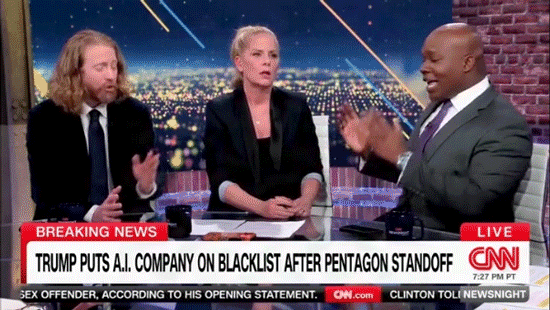Democratic Senators Fetterman, Feinstein face concerns over health
‘Outnumbered’ hosts weigh in on the health of top Democrat leaders and discuss proposals for how to handle lawmakers who become unwell during service.
The subjects of mental and physical competency in elected office has become a fierce debate in recent months. Back in February, Republican presidential candidate Nikki Haley called for a mandatory cognitive test for politicians 75 and older, a not-so-subtle dig at 80-year-old President Biden and her 76-year-old GOP rival former President Trump. Poll after poll have shown voters, even among Democrats, increasingly concerned about Biden's age as he seeks reelection in 2024. And his presidency has not been short of gaffes, verbal stumbles and various memory lapses.
Such health concerns have also bled into the Senate, particularly towards two Democrats.
The first is California Sen. Dianne Feinstein, who returned to Capitol Hill in early May following a roughly three-month absence due to shingles, which was later revealed to have led to neurological complications from Ramsay Hunt syndrome that affected her brain and face. This came following months of reports alleging Feinstein's mental decline.
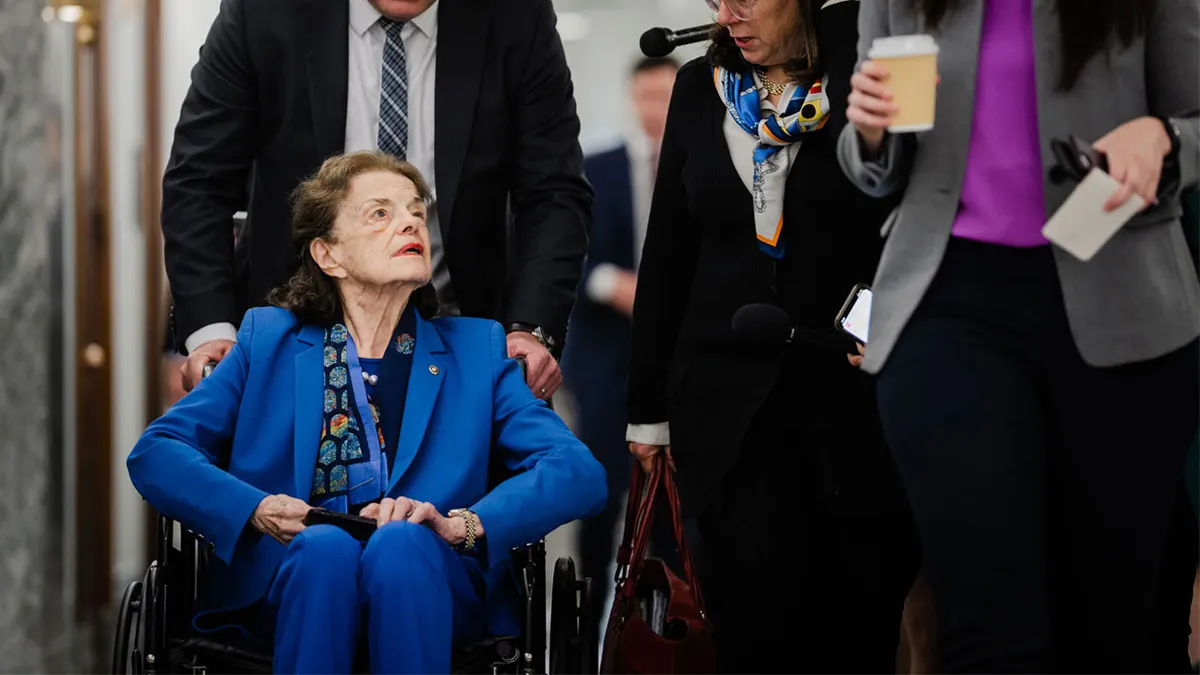
Sen. Dianne Feinstein (D-CA) has been spotted being wheeled around the Capitol Building by staff following her months-long absence from the Senate. (Kent Nishimura / Los Angeles Times via Getty Images)
The second is Pennsylvania Sen. John Fetterman, who similarly had a lengthy absence after he was hospitalized in February for depression believed to have been stemmed from a stroke he suffered a year ago (he returned to work in April). Like Feinstein, concerns about Fetterman's fitness to serve clouded his low-profile Senate campaign though he ultimately won his race despite them.
Both the senior and freshman Democrats have made unflattering headlines as of late. Slate reported that Feinstein claimed she hadn't been gone from the Senate and told a reporter "I’ve been working" the entire time. She also reportedly confused Sen. Tim Scott, R-S.C. with then newly-elected Sen. Raphael Warnock, D-Ga., accidently congratulating Scott for Warnock's own victory during a 2021 interaction. Meanwhile, Fetterman had gone viral over his incoherent line of questioning at the Senate Banking Committee hearing, something that was further exacerbated by his office who was caught doctoring his spoken remarks after a Washington Post reporter unwittingly tweeted one out believing it was a direct quote.
But that's where their similarities end.
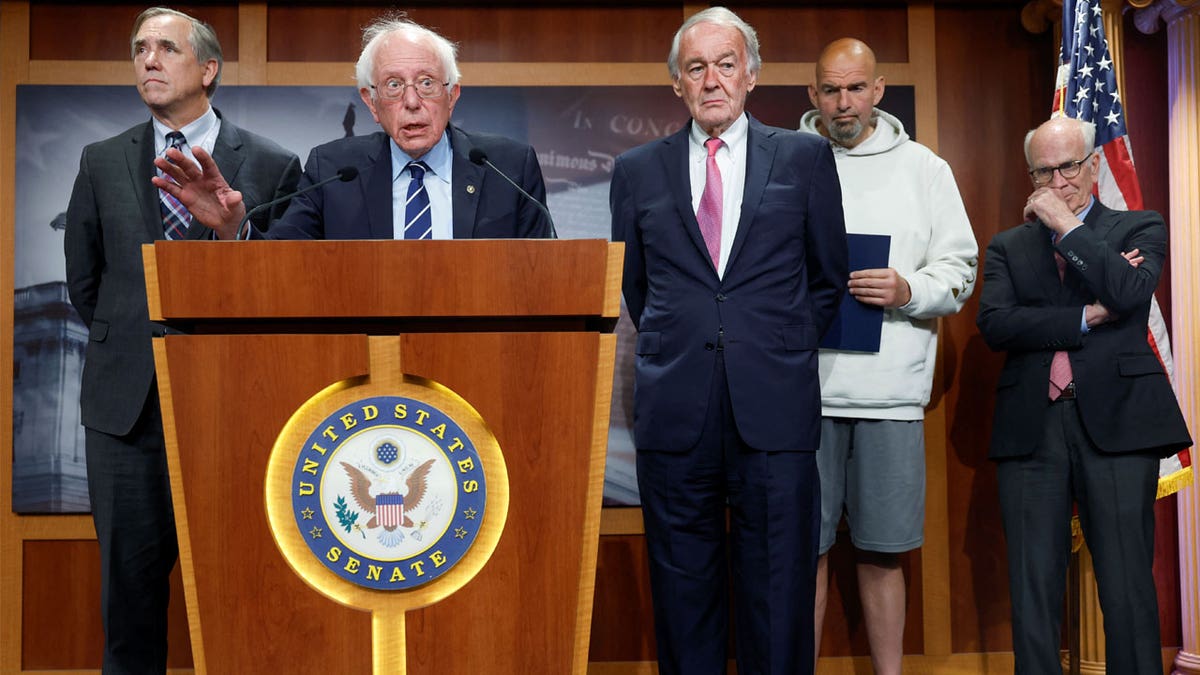
Sen. John Fetterman, D-Penn., began wearing hoodies and shorts to work amid his recovery from a stroke while his Democratic colleagues continue wearing suits. (REUTERS/Evelyn Hockstein)
Feinstein, who is just days away from turning 90 years old and is set to formally retire at the end of her term in January 2025, has been increasingly facing calls from the media for her resignation, notably echoing a growing sentiment among Democrats. Before her return to Capitol Hill, The New York Times editorial board wrote "If she cannot fulfill her obligations to the Senate and to her constituents, she should resign and turn over her responsibilities to an appointed successor."
Her absence fueled consternation in the legacy press, particularly since she was widely blamed from halting the confirmation of Biden's judicial nominees as a key vote on the Senate Judiciary Committee. In April, The Los Angeles Times editorial board hinted for her to step down, writing "With the balance of power so tenuous in Washington and the stakes so high at every election, there’s no leeway to keep missing critical votes. We wish Feinstein well in the coming days as she considers perhaps the most difficult decision of her long, storied career."
A Times editorial writer recently penned a piece with the headline "The Feinstein dilemma: When is a lawmaker no longer able to serve?"
DIANNE FEINSTEIN WAS SICKER THAN PUBLIC KNEW DUE TO SHINGLES THAT CAUSE BRAIN INFLAMATION
The co-hosts of "The View" unanimously agreed that Feinstein had to go. Sunny Hostin insisted she's "not fully healed" and that "it's time for her to put the country before herself" while Sara Haines quoted singer Kenny Rogers who famously sang "You got to know when to fold'em… know when to walk away."
CNN anchor Jake Tapper attempted to pressure Democrats into calling for Feinstein's ousting, passionately telling her Senate colleague Dick Durbin in an interview earlier this month, "I mean, all due respect, sir. You and your fellow Democrats were very ginger and very polite when it came to Justice Ruth Bader Ginsburg and not pushing her to retire when you had a Democratic majority in the Senate. How’d that work out for you? How’d that work out for Roe v. Wade?"
The Intercept reporter Ken Klippenstein went even further with a viral rant to "name and shame Dianne Feinstein's staff" by blasting their names and photos on Twitter and saying they "should be blacklisted from politics forever for caring so little about their country that they refuse to resign."
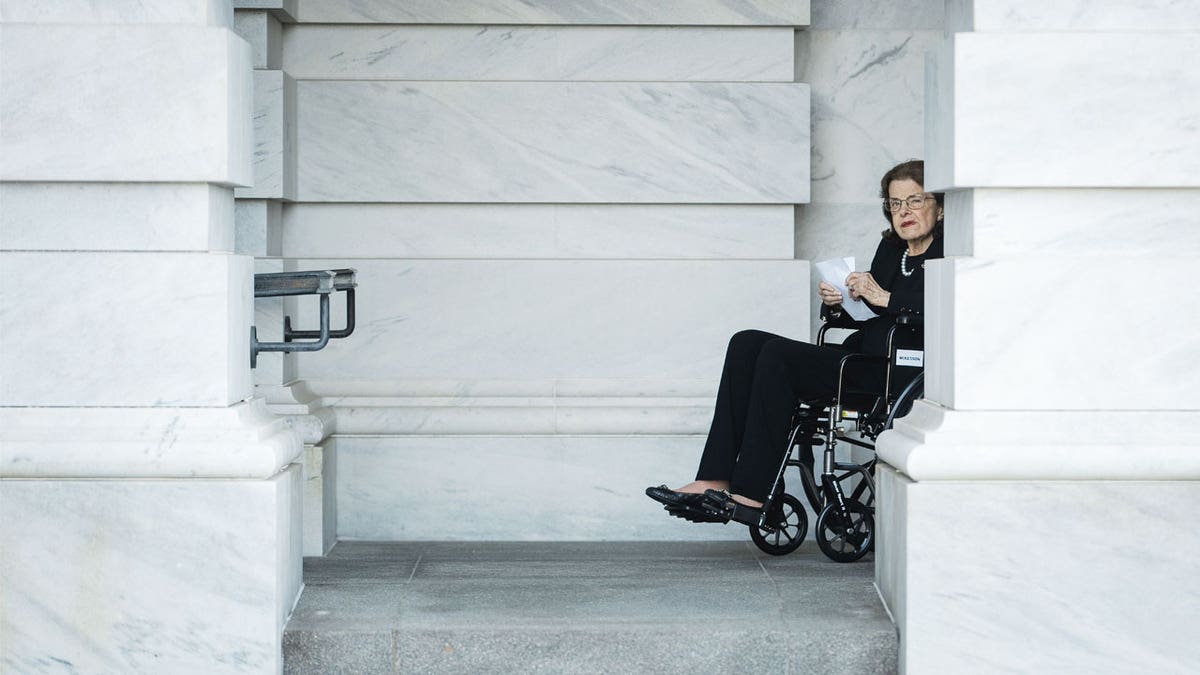
Feinstein was wheeled behind a pillar as she was leaving the Capitol. (Kent Nishimura / Los Angeles Times via Getty Images)
Meanwhile, Fetterman has avoided such hostility from members of the media. In fact, they rallied behind him after his first in-person on-camera interview following his stroke exposed the severity of his condition.
In October, NBC News reporter Dasha Burns revealed that during their interview, Fetterman relied on closed-caption technology from a desktop computer, so he could read questions in real time. She also claimed "it wasn't clear he was understanding our conversation" during small talk with the then-candidate.
That spark unprecedented backlash towards the NBC reporter and over-the-top protection for the Democratic hopeful.
"I interviewed him - there were absolutely no issues. I probably stumbled more," MSNBC host Stephanie Ruhle wrote in a now-deleted tweet.
LIBERALS RUSH TO DEFEND FETTERMAN AS REPORTERS QUESTION HIS MENTAL FITNESS FOLLOWING NBC INTERVIEW
"Sorry to say, but I talked to @JohnFetterman for over an hour without stop or any aides and this is just nonsense. Maybe this reporter is just bad at small talk," New York Magazine's Kara Swisher knocked the NBC reporter.
"I interviewed @JohnFetterman here, he understood everything I was saying, and he was funny," podcast host Molly Jong-Fast said.
"Here’s my interview with @JohnFetterman from a few days ago. The notion that he wasn’t able to understand is mind-numbingly false," liberal YouTube personality Brian Tyler Cohen tweeted.
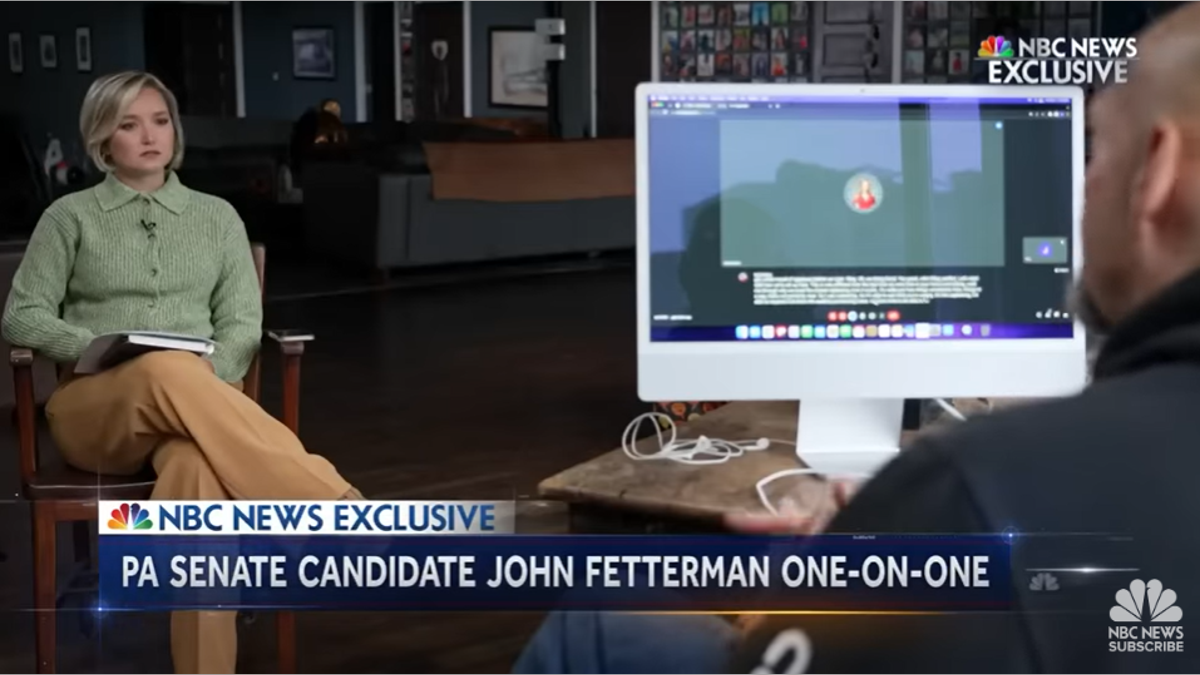
NBC News' Dasha Burns was blasted by liberal media critics for shedding light on the severity of then-candidate John Fetterman's health condition. (NBC News / YouTube)
"The corporate media worked in collaboration with the Democratic establishment to essentially conceal the major health concerns of John Fetterman during the campaign, in what was a coordinated effort to ensure the Senate would stay blue," Fourth Watch media critic Steve Krakauer told Fox News Digital. "Perhaps they didn't know the true extent of his health issues… But at the bare minimum, they worked overtime to minimize what everyone could see with our own eyes - that sadly Fetterman was suffering from the effects of the stroke."
Following Fetterman's debate performance that further put a spotlight on his cognitive abilities, several news organizations framed attacks towards his fitness to serve as "ableism" and described his condition a "disability."
"One in four Americans has a disability, but disabled politicians are rarely on the national debate stage. That made John Fetterman’s appearance a powerful moment, but public reactions were painful," The New York Times wrote.
"Fetterman debate reaction reveals stigma disabled candidates face," a headline from The Washington Post read.
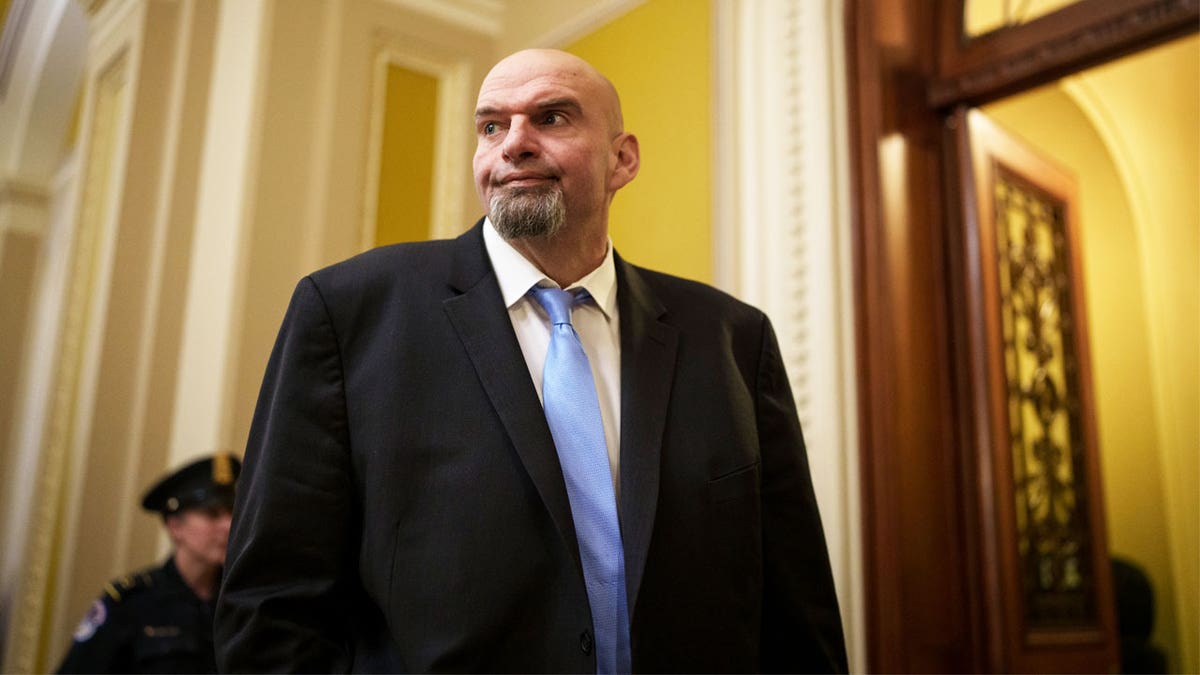
Members of the liberal media rallied behind Sen. John Fetterman, D-Penn., during the 2022 midterms after his visible symptoms from his stroke became a cause for concern among voters. (Drew Angerer/Getty Images)
ABC News reported at the time "Disabled activists say persistent, ongoing jabs about Fetterman's condition despite his perseverance on the campaign trail highlight the ways in which ableism turns a condition someone is experiencing into a weapon to be used against them to make assumptions about their abilities." Salon similarly ran the headline "Disability activists say John Fetterman stroke controversy has veered into ableist territory." Teen Vogue published an op-ed titled "John Fetterman’s Stroke Has Led to Ableist Criticism From Media, Politicians."
"The View" co-host Hostin, who this month urged Feinstein to resign, accused Fetterman's GOP rival Dr. Mehmet Oz of "bullying" a stroke victim and insisted the Democrat showed "real bravery" on the debate stage.
Even after he was sworn into office, Fetterman maintains his media defenders. The Associated Press claimed on Sunday he was making a "robust recovery," hyping that "he’s back to wearing the hoodies and gym shorts he was known for before he became a senator."
Krakauer views the disparity between the media's treatment towards Fetterman and Feinstein as political since Feinstein represents a "safe blue state" and her term is up after 2024 while Fetterman from a more purple state 'just got in there."
For those in the media who aided Fetterman during the campaign, Krakauer says, they will likely overlook the senator's current struggles since it would otherwise "force them to wrestle with their own culpability."
"But even more sinister, the forces who hid the truth about his ailments have brought back the severe depression he suffered with, and, it appears he is still suffering with, rather than allowing him to get well," Krakauer said.
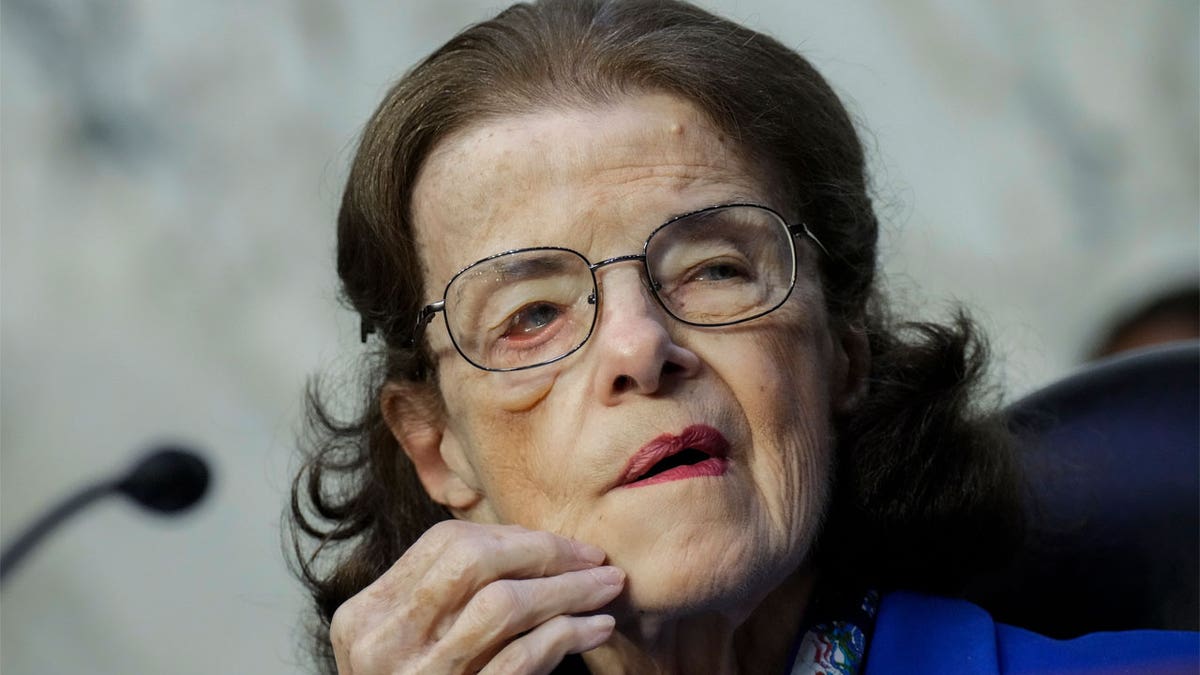
Media outlets have joined vocal Democrats in calling for Sen. Dianne Feinstein, D-Calif., to resign from office due to her deteriorating health. (Drew Angerer/Getty Images)
Some top Democrats including New York Sen. Kirsten Gillibrand and California Rep. Nancy Pelosi have suggested it's sexist to call for Feinstein's resignation but not Fetterman's. Cornell Law School professor and media critic William A. Jacobson rejected that notion, telling Fox News Digital it's "internal Democrat power politics" at play.
"Feinstein has very important senior committee assignments, including Judiciary, Intelligence, and Appropriations, and there are more than a few Democrat Senators who would benefit if she were to depart. Fetterman, by contrast, has junior assignments to less important committees," Jacobson said.
"Additionally," Jacobson continued, "Feinstein is viewed as a dinosaur relic of the old, more mainstream, Democratic Party, while Fetterman represents the more radical leftist wing of the party, which is rising in influence. So Feinstein has very little cover from her colleagues and party."
There has reportedly been infighting among Democrats over whether to force Feinstein out. Pelosi, for example, is allegedly favoring Feinstein to finish her term as it would help the former speaker's endorsed candidate as Feinstein's successor Rep. Adam Schiff, D-Calif., in his bid (A Pelosi spokesperson pushed back against those claims, saying her friendship with Feinstein is "personal, not political" and that the senator's timeline is "entirely her own decision.") while her immediate removal will pave the way for California Gov. Gavin Newsom to pick Feinstein's successor instead, who he already committed to selecting a Black woman to fill any Senate vacancy, giving a potential incumbency edge to Schiff's primary rival Rep. Barbara Lee, though Newsom is reportedly considering other candidates including Oprah Winfrey.
Regardless, an appetite for Feinstein's retirement has been longstanding as Schiff and Rep. Katie Porter threw their hats in the ring even before the six-term senator announced her plans.















